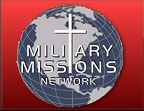 Militaries of the world have always been at the leading edge of intercultural relations and security remains one of America’s most significant exports. If professional exposure to some of the neediest parts of the world creates ministry opportunities, then no segment of the Church in America is more strategically positioned for advancing the Great Commission than Christians who are in the U.S. military.
Militaries of the world have always been at the leading edge of intercultural relations and security remains one of America’s most significant exports. If professional exposure to some of the neediest parts of the world creates ministry opportunities, then no segment of the Church in America is more strategically positioned for advancing the Great Commission than Christians who are in the U.S. military.
But what is the Great Commission?
The imperative command in the Great Commission (Matthew 28:19-20) is the word for “disciple.” It is the only imperative verb in the Great Commission. The word commonly translated into English as “go” is not an imperative command. It is a modifying participle, otherwise known in English as an “-ing” word.
The Great Commission has three modifying “-ing” words. These words modify the imperative. They describe how to “disciple.” They are the words “going,” “teaching,” and “baptizing.” Jesus tells his followers to “disciple” by “going,” “baptizing,” and “teaching.”
The verb “disciple” is transitive. That means it takes a direct object. That object is commonly translated into English as “all nations.” So the question becomes, “What does it mean to disciple a nation?”
The actual Greek words translated into “nation” are “panta ta ethne” from which the English word “ethnic” comes. So a better translation of the verb with its object is, “Disciple all ethnolinguistic groups!”
Curiously, the grammatical object to be discipled is not individuals but entities. And significantly, the subject commanded isn’t individuals but the whole group of Jesus’ followers. It includes you and me, but not just you and me as individuals but also you and me as members of the entire group – the Church.
So how do you and I use our lives and our unique set of talents and enthusiasms to participate in the Church’s mission to insure “all peoples” get discipled?
I think we pursue what we love to do and what God has uniquely inspired us to do in a way that serves and grows the dominion and prestige of Jesus Christ (the Kingdom of God) into new ethnolinguistic territory. That to me is the essence of obeying the Great Commission.
So how does this practically integrate service and life after service?
- First, it means that every endeavor from career to hobby and family life coordinates with deliberate efforts to “disciple” entire “ethnolinguistic groups.”
- Second, it means we do not act alone. Imperfect as they are (because we are not perfect), we must join with others in organizations or associations that intend to strategically impact entire ethnolinguistic entities.
- Third, it means we engage or support those engaging ethnolinguistic groups that do not yet have any discipling happening among them. Cross-cultural testimony has got to happen, and it will, whether voluntarily or involuntarily. Jesus said that the “end” will not come until the “gospel of the Kingdom” is “proclaimed” in every ethnolinguistic entity (Matthew 24:14). See my article “Who Are Unreached Peoples” for a definition of this frontier.
Discipling cross culturally takes capacity in at least four areas:
- Bible, ecclesiology, and targeted cultural anthropology. “Discipling a nation” requires a robust knowledge of the Bible and a firm understanding of what the Church of Jesus Christ is and what it is not in various cultural contexts. Choosing partners and participating in activities that advance the Kingdom of God in new contexts without cultural baggage take capacity in Bible, ecclesiology, and cultural anthropology.
- Language and cultural adjustment. To understand and have a sphere of influence takes fluency and comfort, not just with language but also with different roles and values around which people organize and govern their lives. This requires being a learner before becoming a teacher. Language school, Rosetta Stone or a LAMP immersion program are good tools. An introductory course on the science of linguistics can really help with self directed study.
- Marriage and family enrichment. This is the most easily overlooked yet often the most significant preparation for endurance on the gospel’s frontier. Cultural and spiritual stress on families is exponentially higher in cross-cultural outreach situations. Organizations like PREP, Missionary Training International, and Link Care can facilitate self-directed study in this area.
- Secular entry skill. Christians can rarely get among “unreached peoples” (except among refugees and international students) as full-time Christian workers. Working among them requires a valid and respected role. Often it is possible to be in both a secular organization and a mission agency. A secular skill provides a platform for operating among “unreached peoples,” and missionary agencies strategically coordinate and assure spiritual capacity.







 Act Beyond
Act Beyond http://www.faithandwar.org
http://www.faithandwar.org Mark Durie's Blog
Mark Durie's Blog Military Missions Network
Military Missions Network The Christian Fighter Pilot
The Christian Fighter Pilot The Navy Christian
The Navy Christian